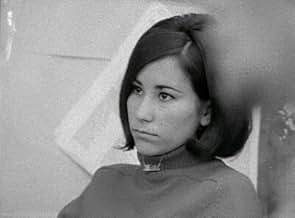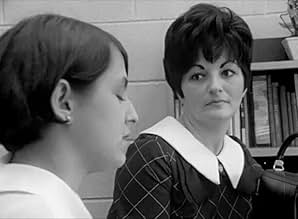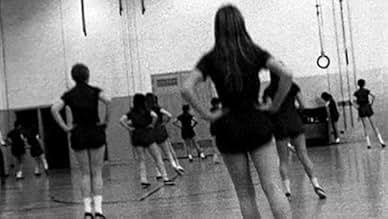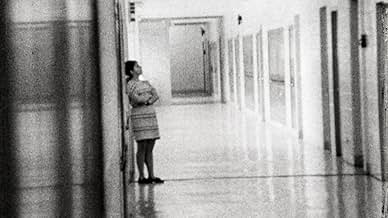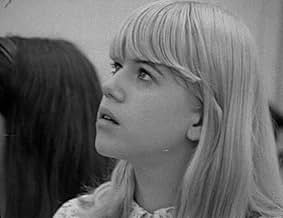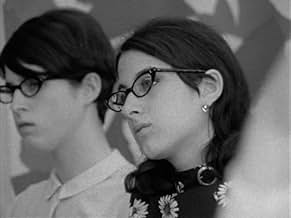Le documentariste Frederick Wiseman nous emmène à l'intérieur de Northeast High School comme une mouche sur le mur pour observer les enseignants et comment ils interagissent avec les élèves.Le documentariste Frederick Wiseman nous emmène à l'intérieur de Northeast High School comme une mouche sur le mur pour observer les enseignants et comment ils interagissent avec les élèves.Le documentariste Frederick Wiseman nous emmène à l'intérieur de Northeast High School comme une mouche sur le mur pour observer les enseignants et comment ils interagissent avec les élèves.
- Réalisation
- Récompenses
- 1 victoire au total
Avis à la une
What I do remember about the pieces I saw was they were real but not quite true. These are images from long ago, but there was something of the fact that most teachers were trying and not intending to be caricatures as I remember them appearing in the film.
What really got me to write was the description of the disciplinarian dean. I also had him as a 12th grade history teacher. Everything said about him by geprescott was very accurate. Our class was not required to read the Sunday New York Times, but I remember the year long project was to choose a country, research it, and then write its foreign policy. I picked the Soviet Union, did my research, and wrote a paper aimed at making life as difficult as possible for the US. I don't remember the actual comments but I remember being pleased with the final grade.
I never saw this entire film and am not sure where to find it now. I'd like to watch it with my kids.
The faculty of NorthEast high school in Philadelphia are the stars. The viewer decides whether their actions are good or bad. There's certain purity at work. Is it an imperfect system? You bet it is. Do rules appear petty and draconian? Yes, they do. But there is hope inside the bubble. The faculty at NorthEast could be teachers at my high school. We have the flat-topped disciplinarian, the hip, young English teacher, the no-nonsense fashion matron, and the boring instructor with the bad teeth.
The scene with the coach and the graduate who visited while on leave from Vietnam illustrated one of the prominent themes; this environment is in a bubble insulated from community and society. In this scene, the coach made a connection between a soldier's war wound and the effect on his sports career. He was so wrapped up in his role as the school coach; he immediately applied news from the outside world to his microcosmic world inside the school grounds.
This theme was also reiterated by a boy in one of the rare scenes where students were the stars. The would-be bohemian said as much; this school is a cloistered, closed system. The bubble theme is further underscored by the sequence where three boys emerged from a space capsule simulator after 193 hours. There was much fanfare for the successful end to 'Project SPARC' including a telegram from astronaut Gordon Cooper, read with typical dragnet-style inflection by the sponsoring teacher.
In fact, several scenes feature extended recitations of written material by instructors who suffer from chronic educational ennui. There is the flat rendition of 'Casey at the Bat', the review of the typing test text, and the dreaded retelling of the "thought for the day" from the daily bulletin. A glimpse of self-awareness offered by a young English teacher was most startling. In the course of dissecting Paul Simon's poem "The Dangling Conversation", she read it aloud first, and followed with the Simon & Garfunkel song version. She told the students to listen to both versions. The poem came alive with the music. A lingering shot of the teacher showed the hope in her eyes that someone will get the message. For me, it's the best sequence in the film. If Wiseman wanted to underscore a failure of the system, it lied not with the disciplinarian tactics or heavy-handed advice dispensed by the staff, but with the inadequacy of the delivery methods used by educators.
The message turns hopeful in the last scene. A teacher reads a letter at a faculty meeting written by the former student on station in Vietnam. Tight camera work reveals the emotion of the reader, in contrast to the non expressive faces of the previous speakers. The written word provides power after all. There's hope on the part of the student to survive outside the system, hope on the part of the administrator reading the note that they do have an impact on their charges, and hope that inside a flawed machine such as the educational system, someone gets the message.
Wiseman has stated that with "Titticut Follies" and his next film, "High School", he had more of a fixed idea of what he was trying to go for (as opposed to his later, more thematically ambiguous films). But even so, that does not mean that the individual member of the audience cannot get what he or she wants out of what has just been seen. In a 1998 interview with "The Boston Pheonix", Wiseman stated: "When [High School] was first shown in Boston, in 1969, one of the people who saw it was a very conservative member of the Boston School Committee. I thought she'd hate the movie. But she came up and said, 'Mr. Wiseman, that was a wonderful high school!' I thought she was kidding me until I realized she was on the other side from me on all the value questions. Everything I thought I was parodying, she thought was great. I don't think her reaction represents a failure of the film. Instead, we have an illustration that reality is ambiguous, a complex mirror that the 'real' film takes place where the mind of the viewer meets the screen. It's how the viewer interprets the events."
In the above case, it would seem that the film is only unfair if you dislike what you see. The woman disagreed with what Wiseman was saying, but she still liked the film, because she felt that the images were strong enough to counter what Wiseman's intentions for the film were. So then does it really matter if he was "parodying" his subjects?
Of course we could look deeper into a film like "High School", at more minute details, to see better, less broad examples of what could be considered unethical practices. In one scene, a teacher teaches a class and we see a close-up of her face, wearing thick, horn-rimmed glasses. About this shot, Calvin Pryluck writes, "One can wonder how the teacher in High School feels about herself since seeing herself seeing her bottle-thick eyeglass lenses larger than life on the screen." Small matters like this are important. But is the woman's appearance Wiseman's problem? Perhaps he chose the close up to emphasize the look on her face. Perhaps then if the woman feels embarrassed, then that is for her to worry about, no one else.
Le saviez-vous
- AnecdotesThis film was selected to the National Film Registry, Library of Congress, in 1991.
- Citations
Male Authority Figure: It's nice to be individualistic, but there are certain places to be individualistic.
Female Student: I didn't mean to be individualistic.
Male Authority Figure: No, I'm not criticizing!
- ConnexionsFollowed by High School II (1994)
- Bandes originales(Sittin' On) The Dock of the Bay
(uncredited)
Written by Steve Cropper and Otis Redding
Performed by Otis Redding
Meilleurs choix
- How long is High School?Alimenté par Alexa
Détails
- Date de sortie
- Pays d’origine
- Sites officiels
- Langues
- Aussi connu sous le nom de
- Student Affairs
- Lieux de tournage
- Société de production
- Voir plus de crédits d'entreprise sur IMDbPro
- Durée
- 1h 15min(75 min)
- Couleur
- Mixage

